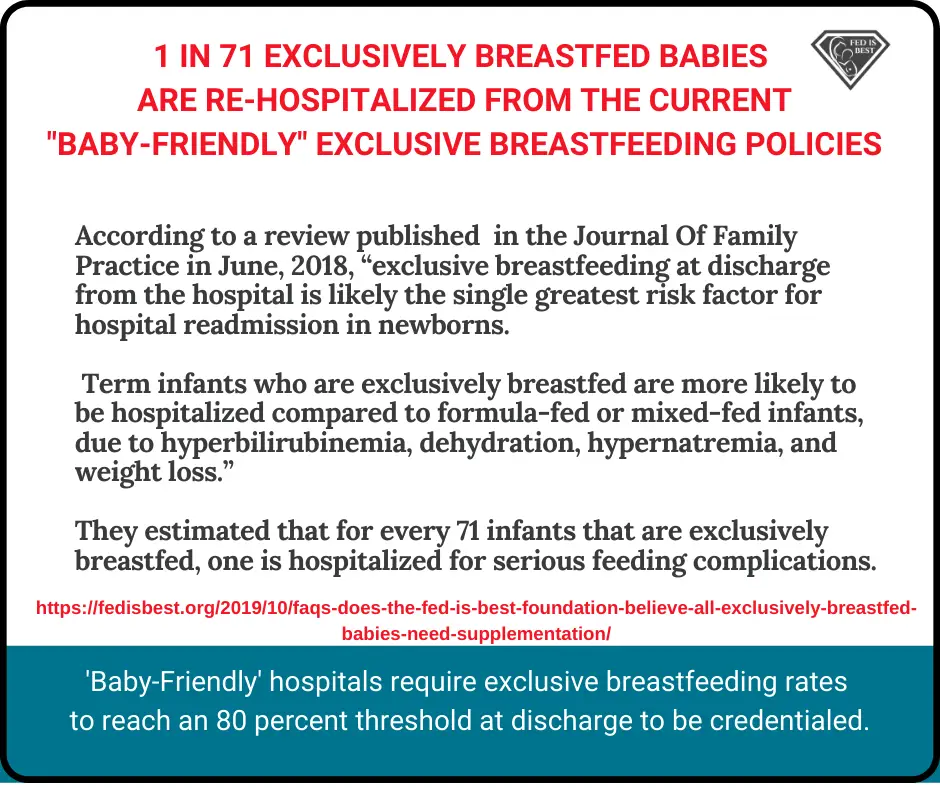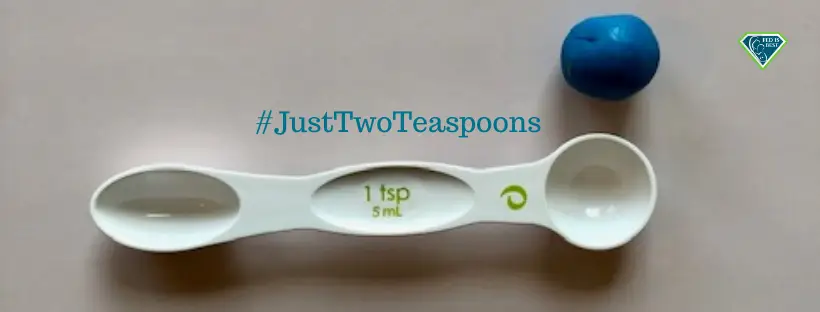Written by Jody Segrave-Daly, RN, IBCLC and Lynnette Hafken, MA, IBCLC
There have now been six studies showing that in some infants, a little bit of supplementation with two teaspoons (10 mL) of formula or donor breast milk after nursing had no effect on long-term breastfeeding. One study showed it prevented hospital readmissions in all of the supplemented newborns. Another showed it actually helped breastfeeding!
Why aren’t medical and lactation professionals recommending this intervention?
Many medical and lactation professionals believe that a tiny amount of formula will contaminate the baby’s gut, causing lifelong health problems. They refuse to admit that formula supplementation can be helpful, and they have baseless concerns that temporary formula supplementation will become routine for all babies. According to Baby-Friendly USA, “donor [breast] milk takes the fight out of this.” What they mean is that the few babies who are born in a hospital with donor milk can be fully fed, while the vast majority of babies who are born in hospitals without donor milk just have to tolerate hunger and thirst so as to avoid a few teaspoons of formula.
Did you know two teaspoons of formula or donor milk has seven calories?
They argue that formula will change the beneficial bacteria in the baby’s gut, but this change is safe and only temporary—and pales in comparison to the risks of potentially life-threatening complications from insufficient colostrum, like jaundice, low blood sugar, and dehydration, which can be caused by acute starvation. What about sensitizing the infant’s gut to cow’s milk protein? There is no evidence that early limited formula supplementation has any impact on babies’ future health. If someone has this evidence, please come forward. In addition, if anyone has is concerned about cow’s milk formula, there are formulas that have those proteins broken down (hydrolyzed) that can also be used. The fact that lactation and medical professionals have not promoted and implemented this life-saving solution shows that the real issue is bias against formula use, pure and simple. Do they hate formula products so much that they don’t care if your baby suffers from hunger?
The question is, how many randomized, controlled studies support Step 6 of the WHO’s Ten Steps to Successful Breastfeeding to avoid supplementation from birth in order to improve breastfeeding outcomes? None. Absolutely none.
In the meantime, parents and health care professionals can be assured that if a baby shows signs of persistent hunger after breastfeeding, just a few teaspoons of formula or donor milk (if available) can satiate the baby’s unrelenting hunger, will not cause breastfeeding problems, and even reduces the risk of re-hospitalization due to the baby not getting enough milk.

As long as the mother’s milk supply is protected by the baby breastfeeding at least eight times a day, or in some cases adding milk expression to the feeding plan, the baby can return to exclusive breastfeeding when the mother’s milk comes in.
Supplementation does not destroy mothers’ confidence in their bodies; it gives them the confidence to know they can care for their babies no matter what happens, and it gives them the knowledge they need to support their milk supply until it increases to meet the baby’s needs.
Do you want to be successful with breastfeeding while protecting your baby from hunger? Follow your instinct and your baby’s cues, and don’t be afraid of giving your baby a little extra nutrition until your milk comes in!
The Fed Is Best Foundation IBCLC Team
#JustTwoTeaspoons #FedIsBest #SafeBreastfeeding
*Only some infants were supplemented. Babies received 10 mL of formula by syringe after breastfeeding if they met the following criteria: >75th %ile weight loss for age, irritability such as crying and hungry behavior, and if their mothers requested it. Mothers were instructed to stop supplementing after their milk came in.
Note: If a baby is still showing hunger cues after those 10 mL, you can repeat with another 10 mL until the baby is satisfied.
Resources
- Limited Amount of Formula May Facilitate Breastfeeding: Randomized, Controlled Trial to Compare Standard Clinical Practice versus Limited Supplemental Feeding
- The Effect of Early Limited Formula on Breastfeeding, Readmission, and Intestinal Microbiota: A Randomized Clinical Trial
- Limited Amount of Formula May Facilitate Breastfeeding: Randomized, Controlled Trial to Compare Standard Clinical Practice versus Limited Supplemental Feeding
- Effect of Donor Milk Supplementation on Breastfeeding Outcomes in Term Newborns: A Randomized Controlled Trial
- Effect of Early Limited Formula on Breastfeeding Duration in the First Year of Life
- In-hospital formula supplementation and breastfeeding initiation in infants born to women with pregestational diabetes mellitus
Feed Your Baby—When Supplementing Saves Breastfeeding and Lives
How To Prepare For Supplementing When Breastfeeding Your Baby In The Hospital
HOW YOU CAN SUPPORT FED IS BEST
There are many ways you can support the mission of the Fed is Best Foundation. Please consider contributing in the following ways:
- Join us in any of the Fed is Best volunteer and advocacy, groups. Click here to join our health care professionals group. We have: FIBF Advocacy Group, Research Group, Volunteer Group, Editing Group, Social Media Group, Legal Group, Marketing Group, Perinatal Mental Health Advocacy Group, Private Infant Feeding Support Group, Global Advocacy Group, and Fundraising Group. Please send an email to Jody@fedisbest.org if you are interested in joining any of our volunteer groups.
- If you need infant feeding support, we have a private support group– Join us here.
- If you or your baby were harmed from complications of insufficient breastfeeding please send a message to contact@fedisbest.org
- Make a donation to the Fed is Best Foundation. We are using funds from donations to cover the cost of our website, our social media ads, our printing and mailing costs to reach health providers and hospitals. We do not accept donations from breast- or formula-feeding companies and 100% of your donations go toward these operational costs. All the work of the Foundation is achieved via the pro bono and volunteer work of its supporters.
- Sign our petition! Help us reach our policymakers, and drive change at a global level. Help us stand up for the lives of millions of infants who deserve a fighting chance. Sign the Fed is Best Petition at Change.org today, and share it with others.
- Share the stories and the message of the Fed is Best Foundation through word-of-mouth, by posting on your social media page and by sending our FREE infant feeding educational resources to expectant moms that you know. Share the Fed is Best campaign letter with everyone you know.
- Write a letter to your health providers and hospitals about the Fed is Best Foundation. Write to them about feeding complications your child may have experienced.
- Print out our letter to obstetric providers and mail them to your local obstetricians, midwives, family practitioners who provide obstetric care and hospitals.
- Write your local elected officials about what is happening to newborn babies in hospitals and ask for the legal protection of newborn babies from underfeeding and of mother’s rights to honest informed consent on the risks of insufficient feeding of breastfed babies.
- Send us your stories. Share with us your successes, your struggles and everything in between. Every story saves another child from experiencing the same and teaches another mom how to safely feed her baby. Every voice contributes to change.
- Send us messages of support. We work every single day to make infant feeding safe and supportive of every mother and child. Your messages of support keep us all going.
- Shop at Amazon Smile and Amazon donates to Fed Is Best Foundation.
Or simply send us a message to find out how you can help make a difference with new ideas!
For any urgent messages or questions about infant feeding, please do not leave a message on this page as it will not get to us immediately. Instead, please email christie@fedisbest.org.
Thank you and we look forward to hearing from you!


One thought on “Dear Parents, Did You Know Just 2 Teaspoons Of Supplementation Can Protect Your Baby And Your Breastfeeding Journey?*”